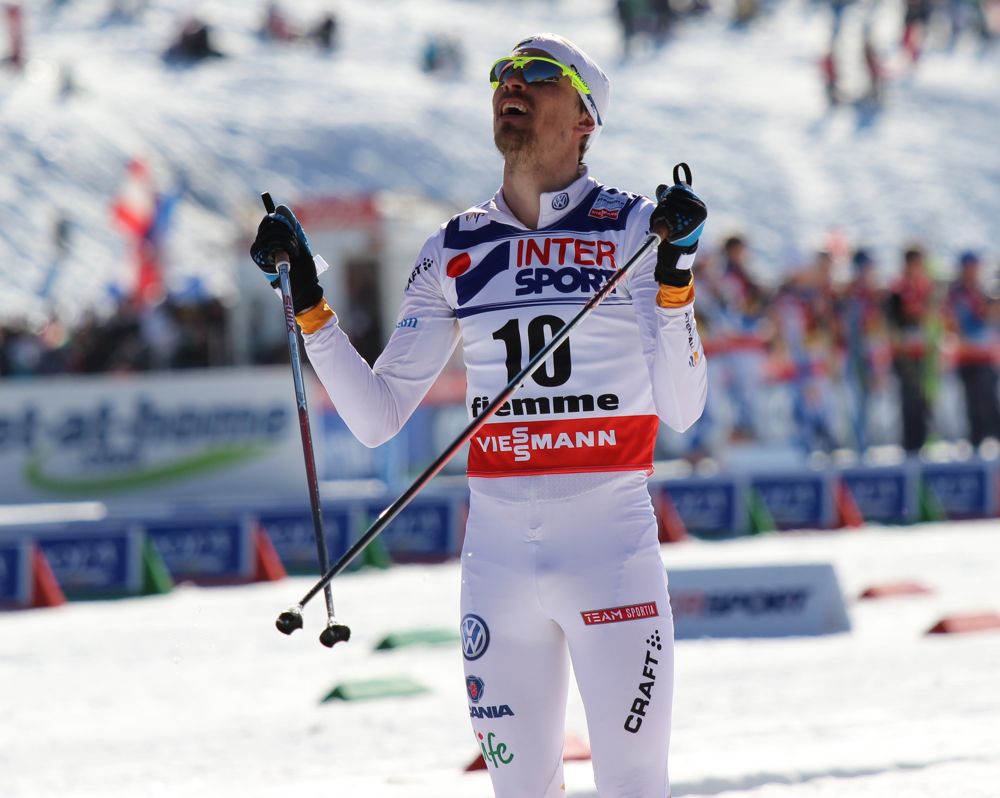
FasterSkier’s coverage of the 2013 FIS Nordic World Ski Championships in Val di Fiemme, Italy, is brought to you by the generous support of Fischer Sports.
VAL DI FIEMME, Italy – Had it been anyone else, the veterans in Sunday’s 50-kilometer classic mass start would have thought Johan Olsson was crazy. But the 32-year-old Swede had been racing long enough to know better than to blow a race that long less than a quarter of the way in. Or did he?
Three-time overall World Cup and Tour de Ski winner Dario Cologna couldn’t be too sure. Unlike those who broke away earlier in the mass start – like Swiss teammate Curdin Perl, who did so in the first kilometer (and later in the first of six laps, a group of five led by Sweden’s Anders Södergren) – Cologna decided Olsson’s breakaway around 11 k was worth worrying about.
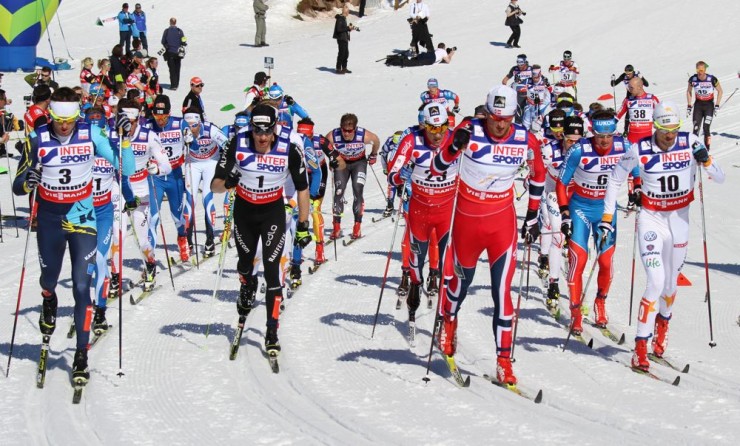
Six seconds back, Cologna caught the 2010 Olympic relay champion around 12.5 k, and the two skied together for the next 8 ½ kilometers. Meanwhile, Russia’s Maxim Vylegzhanin and Alexander Legkov worked to close the gap from behind, coming within 11 seconds of the leaders at the 20.5 k checkpoint.
Moments later, Cologna crashed on the infamous descent athletes call the “elevator shaft.” He was trailing Olsson, caught off balance and fell alone. Initially stunned, Cologna picked himself off the ground before being swallowed by the chase group.
Led by Legkov and Vylegzhanin, the pack was giving Olsson some leeway early in the race. Few thought he could hold it, but they were going to respect him nonetheless and conserve for their own purposes of getting through a hot and sunny afternoon, with temperatures soaring above 12 degrees Celsius (53 Fahrenheit). Meanwhile, the Swede willed himself up front, pushing harder to extend the gap.
Halfway through the race, Olsson had 28 seconds between him and Kazakhstan’s Alexey Poltoranin. There were another 25 men just behind Poltoranin, but Olsson didn’t care. He kept his mind blank, he said, and focused on his own race.
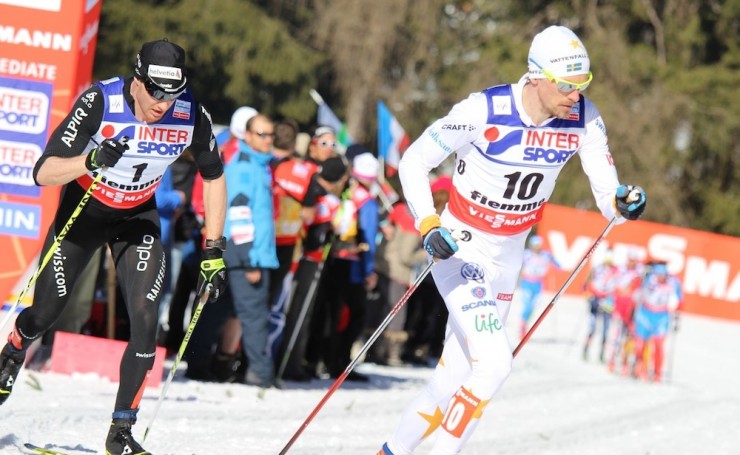
At one point, Olsson did think about the 50 k at the 2010 Olympics, where he took third, one second behind Norwegian winner Petter Northug and Germany’s silver medalist Axel Teichmann. But that was completely different. Olsson was having the race of his life on Sunday, skiing alone in the front, and if he could hold it, he’d be thrilled.
It wasn’t until 500 meters before the finish that Olsson truly believed he could win it.
Olsson had challengers, notably Lukas Bauer of the Czech Republic, who came within 27 seconds of the Swede with 15 k remaining. Olsson’s teammate Daniel Richardsson opted not to change skis before the last lap and came within 12 seconds of him, but Olsson was confident his own skis were better. If not, he’d use whatever energy he had left to help his teammate win. Sweden needed a gold badly in these World Championships, and Olsson was determined to secure it in some form.
As it turned out, neither Bauer nor Richardsson posed a threat, as their separate efforts drained them both. Legkov consistently led the chase group, which remained around 20-strong for much of the race, and came within 25 seconds of Olsson with less than five kilometers remaining.
Still, it wasn’t enough. Olsson refused to relent throughout the entire last lap, pushing all the way into the finish.
Entering the stadium alone, the Swede didn’t let off. Just a hundred meters or so before the finish, he put his hands to his lips and kissed the sky, then took a few strides across the line. After 50 k, he didn’t have the energy nor the demeanor to showboat, and he simply stood soaking up the moment.
“I was so happy when I finished; I saw no reason to lay on the ground,” Olsson said at a post-race press conference. “Maybe I can catch a cold or something.”
Cologna, who took the lead at the start of the last lap then conserved within the pack, positioned himself in second for the last two kilometers. Cruising down the second-to-last downhill, he extended his gap on Legkov, Rønning and Poltoranin, respectively.
The four chased him up the hill, and the group challenged one another for the podium. Far enough ahead, Cologna claimed silver without much trouble, 12.9 seconds behind Olsson, who won in 2:10.41.4. Poltoranin outsprinted Legkov by 2.7 seconds for third (+16.8).
For Olsson, it was his first individual victory at World Championships, and his third medal of the week after taking second in both the 15 k freestyle and 4 x 10 k relay. Both times, he had been a runner-up to Norwegian favorite Petter Northug, who had won the 50 k at the last two World Championships. Olsson predicted Northug could be unbeatable again, which was part of the reason he seized the chance to pull away early.
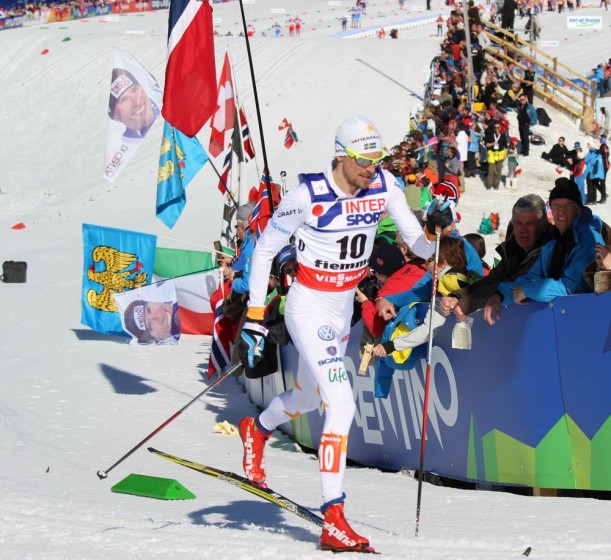
Swedish men’s coach Arild Monsen told NRK he instructed his guys to go hard early and raise the average speed of the race.
“The plan was to avoid that Northug would have the opportunity to win,” Monsen said. “It has happened too many times.”
At the same time, Northug was never really a threat, skiing within the group for most of the race and finishing 21st, two minutes behind Olsson.
“It was going hard from the start,” Northug told NRK. “I had hoped it would go quiet, at least the first three kilometers. I lacked that little extra today, and [then] it became heavy.”
Even Olsson didn’t expect to take off like he did.
“I felt pretty good so I just thought that, ‘OK this might be a really bad move, but I’m going to try to be offensive today and make something of this race,’ ” he said.
Skiing alone for nearly 30 k, he said the most stressful part about it was when his lead stopped growing. Less than a minute wasn’t enough, he thought.
“I thought that this gap is too small, and at least I’m gonna try to make them work to catch me in the last lap,” Olsson said. “It was just like, ‘I don’t want any other medal than the gold so I don’t care.’ I just went for it and that felt really good because I felt like I almost had nothing to lose.”
When he finally secured gold, he said it meant everything.
“I think the 50 k is the finest thing you can win in the World Championships,” Olsson said. “I think still my performance today means more than the gold medal, what I did out there, that I could go solo and just finish first.”
Like most everyone who witnessed it, Norway’s coaches were impressed. Team director Vidar Løfshus told NRK that he’s never witnessed anything like it: a man going it alone for most of 50 k on a flat-out hot day.
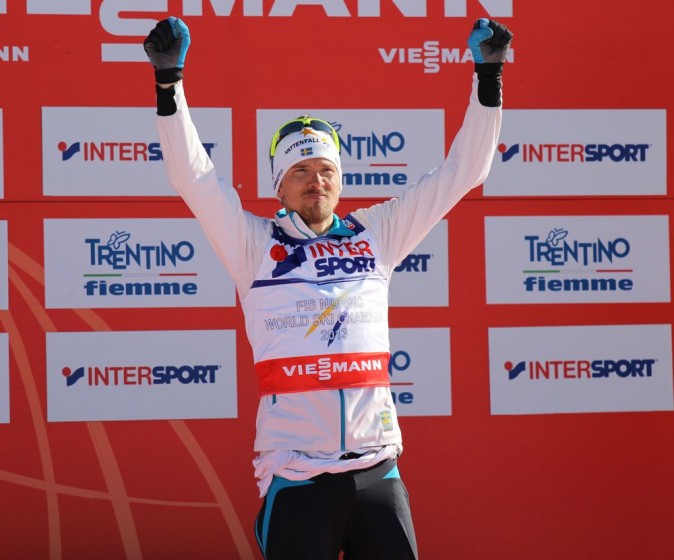
“I think it almost is the greatest 50-kilometer achievement what we’ve seen today,” Løfshus said, according to a translation. “When you go [30 k] in front of this slush, as it says something about that man there.”
Watching Olsson, Løfshus was confident the group would catch him on the last lap. So was Norway’s service chief, Knut Nystad.
“I was pretty sure that Olsson should be obtained,” Nystad said. “It was awesome that he did.”
Cologna said that once he started skiing with the pack, he knew Olsson would be tough to catch unless he started to fade.
“I know that he can ski very fast for a long time,” Cologna said. “I thought, ‘If he’s not very tired in the end, it would be hard to get him.’ … It wasn’t possible to win the gold medal, but he deserved to win today. It was a very strong race by Johan.”
Olsson dedicated the race to his wife and former teammate, Anna Olsson (formerly Dahlberg), a 2006 Olympics team sprint champion.
“Getting the win is something you dream about,” he said. “This gold medal is for my family, my wife, who takes care of our child while I’m here. She makes it possible for me to still be an elite skier.
“This is our first individual gold medal and I don’t think she’s going to make a comeback,” he said with a laugh.
For Sweden, it was the first gold after six silvers in this year’s World Championships.
Norway failed to make the podium for the first time in an individual event all week, with Rønning leading the team in fifth (+20.2). Tord Asle Gjerdalen was sixth, Petter Eliassen 14th, Sjur Røthe 17th and Northug 21st. Germany’s Hannes Dotzler skied a solid race from start to finish, placing seventh (+32.7). Vylegzhanin was eighth, Jens Filbrich of Germany ninth and Richardsson 10th. Bauer ended up 16th, one minute out of first.
Alex Kochon
Alex Kochon (alexkochon@gmail.com) is a former FasterSkier editor and roving reporter who never really lost touch with the nordic scene. A freelance writer, editor, and outdoor-loving mom of two, she lives in northeastern New York and enjoys adventuring in the Adirondacks. She shares her passion for sports and recreation as the co-founder of "Ride On! Mountain Bike Trail Guide" and a sales and content contributor at Curated.com. When she's not skiing or chasing her kids around, Alex assists authors as a production and marketing coordinator for iPub Global Connection.




4 comments
Lars
March 3, 2013 at 4:48 pm
Easily the best race of the championship.
caldxski
March 3, 2013 at 8:18 pm
I’m hoping Olsson’s effort will help to re-define the strategies of long distance racing so shady characters like Northug don’t have such an easy time winning.
davord
March 3, 2013 at 10:41 pm
Agreed, Mr. Caldwell. Drafting for 49.5km and then just sprinting for 30 seconds like Northug does in every single mass start race he has contested (and what Bjoergen did in the women’s race yesterday) is cowardly, IMO. What Olsson did today was inspiring, to say the least. To stay that fresh, focused and inspired for that long, by yourself, on such tough, warm conditions, is out of this world. We see now that a solid, but controlled pace grinds Northug to the ground (that’s why when he gets to the front of the field, he slows it right down, evidenced by the relay), as it did in several tour de ski stages this season. I just wonder if Cologna stayed with Olsson, how much they would have gained over the field. I bet that gap would have been over a minute, easily. Also surprising to see that none of the Germans, Russians, or even Poltoranin tried to go with the Cologna and Olsson, they all were in that main pack, even when it splintered into a small chase group and looking pretty strong. Let’s also not forget that Olsson has had similar (although obviously much shorter) escapes in the past. In Vancouver he went away right after the pit stop in the skiathlon, was only caught with a k or so to go, winning a bronze. Last year in the Nove Mesto 30km classic, he escaped in the second half of the race with Cologna and hung on for the win. This guy is old school. He knows exactly how to manage time trial races, and I bet he does this again in the near future, maybe even at the Holmenkollen in a couple weeks. Very deserving win and thank you to him for skiing like a man amongst the boys, not waiting for the 100 m sprint which happens way too often these days.
highstream
March 5, 2013 at 12:22 am
Harshly put, though I have to agree that it’s time someone(s) pushed the pace in the men’s mass start races, and not just to mess with Northug. With the women, though, it’s not so simple. Bente Skari sometimes used to drop Smigun mid race, everyone else having been left behind well before that, but now I suspect there are only two, maybe three, skiers that could maintain a breakaway a la Olsson for very long, and they’re already at the front of the pack. There’s no incentive for Bjoergen, since she knows she can outsprint everyone else if it comes down to it. And lately, I get the impression that Kowalcyzk is either intimidated by Bjoergen or not in the shape she has been in recent seasons. But certainly, she’s the one who ought to give it a try. Anyone else you’re thinking of?